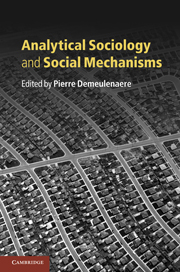Book contents
- Frontmatter
- Contents
- List of figures
- List of tables
- List of contributors
- Introduction
- Part I Action and mechanisms
- Part II Mechanisms and causality
- 5 Generative process model building
- 6 Singular mechanisms and Bayesian narratives
- 7 The logic of mechanistic explanations in the social sciences
- 8 Social mechanisms and explanatory relevance
- 9 Causal regularities, action and explanation
- Part III Approaches to mechanisms
- Index
- References
8 - Social mechanisms and explanatory relevance
Published online by Cambridge University Press: 05 June 2012
- Frontmatter
- Contents
- List of figures
- List of tables
- List of contributors
- Introduction
- Part I Action and mechanisms
- Part II Mechanisms and causality
- 5 Generative process model building
- 6 Singular mechanisms and Bayesian narratives
- 7 The logic of mechanistic explanations in the social sciences
- 8 Social mechanisms and explanatory relevance
- 9 Causal regularities, action and explanation
- Part III Approaches to mechanisms
- Index
- References
Summary
In this chapter I will discuss mechanistic explanation in the social sciences from the point of view of the philosophical theory of explanation. My aim is to show that the current accounts of mechanistic explanation do not serve the agenda of analytical social science as well as they should. I will not challenge the idea that causal explanations in the social sciences involve mechanisms or that social scientists should seek causal explanations and a mechanistic understanding of social phenomena, but will argue that to improve explanatory practices in the social sciences analytical social scientists should employ tools more substantial than the metaphor of a mechanism.
I will begin by presenting the basics of the erotetic approach to explanation and the notion of explanatory understanding. The second section of the chapter argues that mechanisms do have many important roles related to explanation, but that they do not provide a solution to the problem of explanatory relevance. The third section introduces the idea of a contrastive explanandum and argues that paying attention to the identity of the explanandum is a necessary condition for proper assessment of explanatory claims. The fourth section argues that explanatory relevance should be understood as counterfactual dependence and that a manipulationist account of causation provides a fruitful framework for making sense of causal explanations. The fifth section discusses some of the consequences of these ideas for mechanistic explanation in the social sciences.
- Type
- Chapter
- Information
- Analytical Sociology and Social Mechanisms , pp. 154 - 172Publisher: Cambridge University PressPrint publication year: 2011
References
- 15
- Cited by



